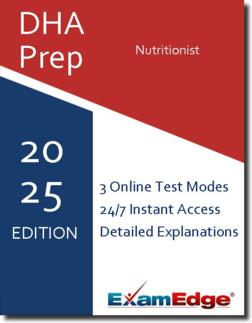DHA Nutritionist Practice Exams & Test Prep - Topics
Based on 40 Reviews
- Real Exam Simulation: Timed questions and matching content build comfort for your DHA Nutritionist test day.
- Instant, 24/7 Access: Web-based DHA Nutritionist practice exams with no software needed.
- Clear Explanations: Step-by-step answers and explanations for your DHA exam to strengthen understanding.
- Boosted Confidence: Reduces anxiety and improves test-taking skills to ace your DHA Nutritionist (NUTRO).

Understanding the exact breakdown of the DHA Nutritionist test will help you know what to expect and how to most effectively prepare. The DHA Nutritionist has 100 multiple-choice questions The exam will be broken down into the sections below:
| DHA Nutritionist Exam Blueprint | ||
|---|---|---|
| Domain Name | % | Number of Questions |
| Fundamental Principles of Nutrition | ||
| Obesity | ||
| Cardiovascular Diseases | ||
| Diabetes Mellitus | ||
| Renal Diseases | ||
| Gastro-Intestinal Diseases | ||
| Metabolic Disorders | ||
| Inflammatory Diseases and Cancer | ||
| Nutrition Support | ||
| Community Nutrition | ||
| Nutrition Through Life Cycle | ||


